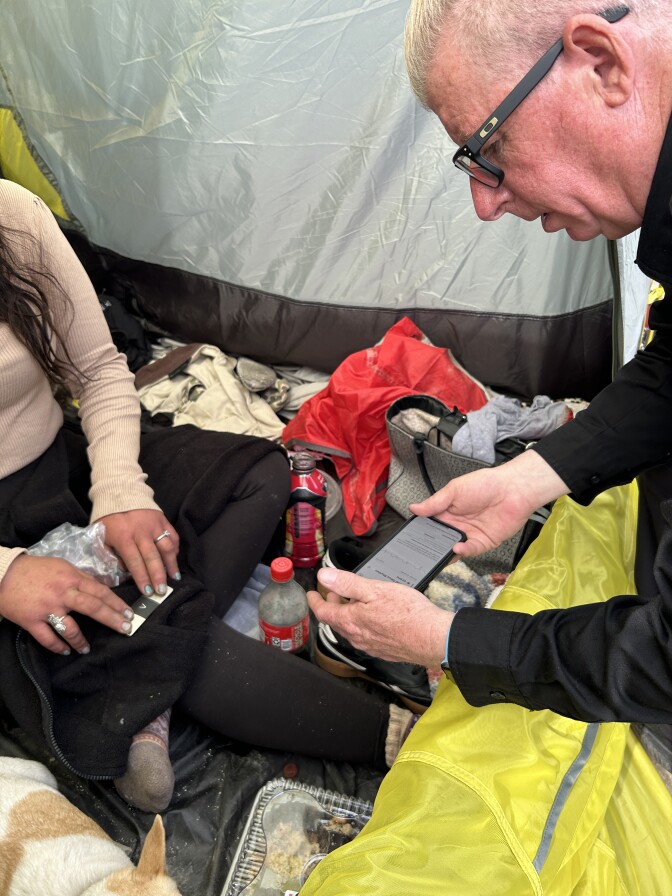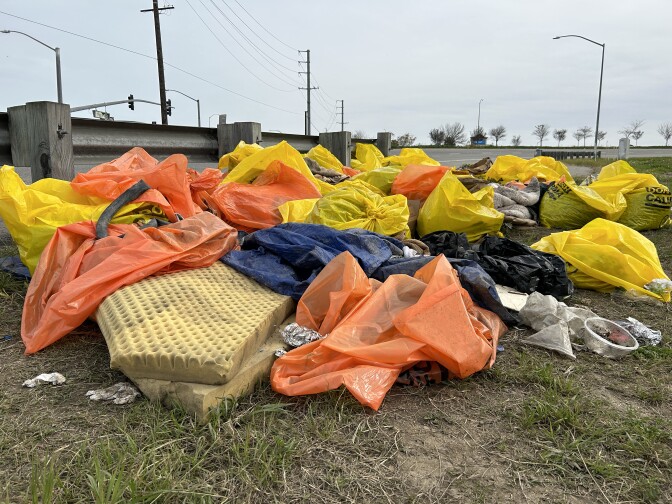This story is free to read because readers choose to support LAist. If you find value in independent local reporting, make a donation to power our newsroom today.
Cold Weather Shelters Are Closing In OC And LA, But Is Winter Really Over?

People sleeping at Orange County's emergency shelter in Fullerton during this unusually cold and rainy winter were dropped off on the streets Friday morning for the last time this season.
Despite the forecasts of cold nightly temperatures and potential rain early next week, county-run winter shelters in Orange and Los Angeles counties are now closed until next winter.
It's not unusual for winter shelters in Southern California to close at the end of March. But the continued inclement weather has some advocates warning of potentially dire consequences for people experiencing homelessness.
Besides cold-related illnesses like hypothermia, cold weather slows blood flow, making wounds harder to heal and more susceptible to infection.
You know how you prevent it? Don't have people live outside during a climate crisis.
"You know how you prevent it? Don't have people live outside during a climate crisis," said Michael Sean Wright, founder of Wound Walk OC, who’s been advocating for an emergency response to homelessness during this record-breaking winter.
Orange County's winter shelter saga
Orange County’s short-lived winter shelter, which operated in a gymnasium at Fullerton's Independence Park, almost didn't happen at all this year. County officials initially put out a request for proposals to run its annual winter shelter last summer. No one stepped up.

The organization Volunteers of America Los Angeles, which ran the county's cold-weather shelter last winter, said it didn't apply to do it again because it couldn't find enough workers.
The Salvation Army eventually agreed to host the county's winter shelter at one of its buildings in Santa Ana, but the city filed a lawsuit arguing that other cities should share the burden, effectively quashing the effort.
Finally, in January, the city of Fullerton agreed to let the county use one of its community centers for the shelter, and the county signed a contract with the organization People Assisting the Homeless (PATH) to run it.
It opened on Feb. 1 — after several major storm systems dumped rain and snow on Southern California in December and January.
Demand grew throughout winter for a warm, dry bed
Orange County’s cold weather shelter is what's known as a "low-barrier" shelter, meaning there are few requirements to get a bed. Most of Orange County's other homeless shelters have higher barriers, like being able to show ties to the city where the shelter is located, or having a referral from a local law enforcement officer or caseworker.
But the cold weather shelter set up this year in Fullerton is bare bones and has not been physically easy to access. People wanting a cot and a warm meal for the night had to be at one of two bus stops in Fullerton at one of two evening pick-up times. At 7 a.m. the next morning, they were dropped off again at those same spots.
Nevertheless, beds at the shelter steadily filled up during the first month after it opened and reached full capacity, 90 people, on Feb. 22, according to Molly Nichelson, an Orange County spokesperson.
At the same time, Wright, whose organization provides first aid to people experiencing homelessness across O.C., said many of his patients weren't even aware there was a winter shelter. Others try to avoid congregate shelters because, for example, of mental health problems or bad past experiences.
Earlier this month, during a recent break in the rain, Wright checked the vitals of a 44-year-old woman named Amanda using a mobile EKG monitor (Amanda declined to give LAist her last name). She and a small group were spread out next to a drainage ditch off of Beach Boulevard in Garden Grove.
Amanda's heart was OK, Wright told her, but Amanda was concerned about her unusually swollen hands. She said she didn't think she could take any more cold or rain.
She and her friends had recently lost most of their possessions, she said, including warm clothes and sleeping bags, in a police raid on their encampment.
"It's so cold," she said, as she sat in her tent and looked around at her sparse belongings. "These are all just jackets, like we have no blankets."
Amanda said she had stayed at shelters in the past but got kicked out of one for using drugs and left another because she was getting beat up at night by other women there.
"It doesn't feel safe, honestly," she said of congregate shelters. "I mean this probably doesn't seem safe to you," she said, indicating her surroundings. "But these are people who care about me, you know? So they wouldn't let anything happen to me."

County says winter shelter users have options
In an emailed statement, Nichelson, the county spokesperson, said people currently staying at the Fullerton shelter know that it's closing and have been given a list of other available shelters. "The services that our permanent shelters provide gives more robust services which better assists the persons experiencing homelessness and their needs," the statement reads.
Wright is livid that local officials haven't stepped up services for people living outside during this unprecedented winter, with things like disaster response tents, warm clothes and additional medical care.
"The county knew that this weather was going to be an issue," he said. "The governor declared a state of emergency including Orange County and nothing changed."
Still, Wright said, community members continue to donate blankets, warm clothes and other supplies to his organization's nightly field operation. "We're proud of our community," he said. "We think that's what works here in the county."
For help finding shelter in Orange County, call 2-1-1. To volunteer or donate to Wound Walk OC, visit woundwalk.org.








